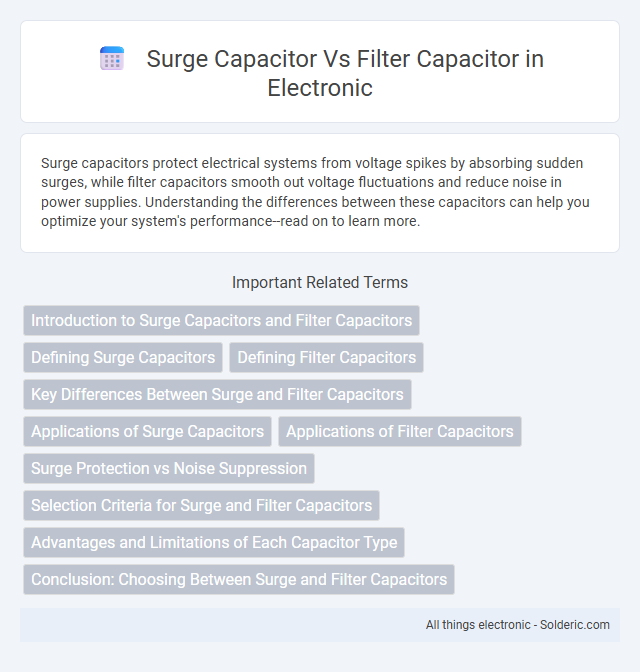Surge capacitors protect electrical systems from voltage spikes by absorbing sudden surges, while filter capacitors smooth out voltage fluctuations and reduce noise in power supplies. Understanding the differences between these capacitors can help you optimize your system's performance--read on to learn more.
Comparison Table
| Feature | Surge Capacitor | Filter Capacitor |
|---|---|---|
| Primary Function | Absorbs and suppresses voltage spikes and surges | Reduces electrical noise and smooths DC output in power supplies |
| Application | Power systems, lightning protection, transient voltage suppression | Power supplies, audio equipment, signal processing |
| Capacitance Value | Typically low to moderate (nano to microfarads) | Typically higher (microfarads to millifarads) |
| Voltage Rating | High voltage rating for surge handling | Moderate voltage rating suitable for DC filtering |
| Response Time | Fast response to transient voltage spikes | Continuous filtering with stable response |
| Energy Absorption | Designed to absorb high energy from surges | Designed for continuous energy smoothing |
| Typical Types | Metalized polyester, ceramic, film capacitors | Electrolytic, ceramic, film capacitors |
Introduction to Surge Capacitors and Filter Capacitors
Surge capacitors are designed to absorb high-voltage spikes and transient surges in electrical systems, protecting sensitive equipment from damage. Filter capacitors, on the other hand, smooth out voltage fluctuations and remove noise by filtering unwanted frequencies in power supplies. Your choice between surge and filter capacitors depends on whether your application prioritizes transient suppression or signal stabilization.
Defining Surge Capacitors
Surge capacitors are specialized components designed to absorb and mitigate transient voltage spikes in electrical power systems, protecting equipment from sudden surges. Unlike filter capacitors, which primarily smooth out voltage fluctuations and reduce harmonic distortion in AC circuits, surge capacitors handle high-energy transient events by rapidly discharging stored energy. Their construction features robust dielectric materials and high surge current ratings to ensure effective voltage spike suppression in industrial and utility applications.
Defining Filter Capacitors
Filter capacitors are electronic components designed to smooth out voltage fluctuations in power supplies by reducing ripple voltage in DC circuits. Surge capacitors, by contrast, are built to handle sudden, high-energy spikes, protecting circuits from transient voltage surges. Filter capacitors typically have high capacitance values and low equivalent series resistance (ESR) to maintain steady DC output, essential in power supply regulation and noise reduction.
Key Differences Between Surge and Filter Capacitors
Surge capacitors are designed to handle high-voltage spikes and transient energy pulses, protecting electrical circuits from sudden surges, while filter capacitors smooth out voltage fluctuations by filtering out unwanted noise and ripple in power supplies. Surge capacitors typically have a higher capacitance rating and robust construction for durability under extreme conditions, whereas filter capacitors prioritize low equivalent series resistance (ESR) for efficient signal stabilization. Your choice between these capacitors depends on whether you need protection from voltage spikes or improved power quality through noise reduction.
Applications of Surge Capacitors
Surge capacitors are primarily used in high-voltage power systems to absorb transient voltage spikes caused by lightning strikes or switching operations, protecting sensitive equipment from damage. Their applications include power substations, transmission lines, and industrial electrical systems where voltage stabilization is critical. Your electrical infrastructure benefits from surge capacitors by maintaining system reliability and extending the lifespan of electrical components under transient conditions.
Applications of Filter Capacitors
Filter capacitors are primarily used in power supplies to smooth out voltage fluctuations by reducing ripple and noise, ensuring a stable DC output for electronic circuits. These capacitors are essential in audio equipment, radio frequency applications, and power management systems to maintain signal integrity and prevent interference. Your devices rely on filter capacitors to enhance performance and extend the lifespan of sensitive electronic components by providing clean and consistent electrical power.
Surge Protection vs Noise Suppression
Surge capacitors are specifically designed to absorb and mitigate transient voltage spikes, providing effective surge protection by preventing damage to electrical equipment. In contrast, filter capacitors focus on noise suppression by smoothing out electrical signals and reducing electromagnetic interference (EMI) within power supplies and electronic circuits. Surge capacitors handle high-energy, short-duration events, while filter capacitors maintain steady signal quality during continuous operation.
Selection Criteria for Surge and Filter Capacitors
Selecting surge capacitors involves prioritizing high voltage withstand capability and rapid energy absorption to protect equipment from transient voltage spikes. Filter capacitors require a focus on capacitance stability, low equivalent series resistance (ESR), and effective frequency response to ensure smooth power delivery and noise reduction. Your choice depends on the specific application demands, with surge capacitors designed for transient suppression and filter capacitors optimized for continuous power conditioning.
Advantages and Limitations of Each Capacitor Type
Surge capacitors excel in handling high-voltage spikes and transient surges, offering superior protection for electrical equipment against sudden power fluctuations, but they have limited use in continuous filtering applications due to their specialized design. Filter capacitors provide efficient smoothing of voltage and reduction of electrical noise in power supplies, ensuring stable DC output, yet they are less effective in managing large transient surges and can degrade faster under high-voltage spike conditions. Choosing the right capacitor depends on your system's needs, where surge capacitors safeguard equipment from voltage spikes, and filter capacitors maintain steady voltage levels and enhance circuit performance.
Conclusion: Choosing Between Surge and Filter Capacitors
Surge capacitors protect electrical systems by absorbing voltage spikes, preventing damage to sensitive components, while filter capacitors smooth out voltage fluctuations to ensure stable power supply and reduce noise in electronic circuits. Your choice depends on whether you need to safeguard against transient surges or improve power quality by filtering out unwanted signals. Selecting the appropriate capacitor type enhances system reliability and performance tailored to your specific application requirements.
surge capacitor vs filter capacitor Infographic

 solderic.com
solderic.com